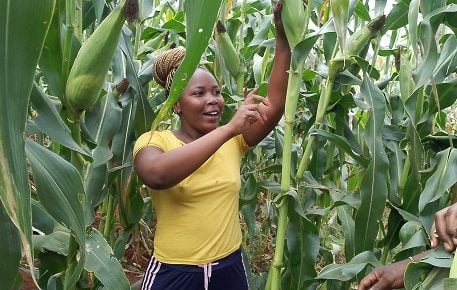Meet Grace Wangechi Kamande, a 27-year-old native of Kirinyaga County in Kenya, who is actively engaged in maize farming.
After trying traditional rain-fed farming and finding limited success, she shifted her approach to embrace irrigation methods.
“I started this farming venture in 2020 after the COVID-19 pandemic disrupted my hairstyling business in Nairobi,” she explains.
In her quest for self-reliance, she crossed paths with a man from the Nyanza region who provided her with capital to sustain herself in the rural area she had fled to.
“Since we hadn’t agreed on marriage, I took the Sh250,000 capital and ventured into my father’s land where I launched my farming journey,” she says.
Kamande shares, “The first season didn’t go as planned. After cultivating the land, factoring in expenses for fertilizers, hiring labor, and buying seeds, I ended up with a mere profit of Sh2,000.”
Waiting three months for the maize to mature for the market, she harvested about 10,000 green maize cobs, selling each cob for Sh8.
“My initial capital dropped to Sh120,000, and I knew I was facing the risk of bankruptcy. That’s when I sought advice from experts on Yara fertilizers and they guided me into adopting irrigation farming,” she explains.
Yara, the company, not only provided guidance on fertilizer usage but also offered quality assessment and measurements, along with seed recommendations.
Through her diligence, Kamande managed to plan for a monthly supply of approximately 50,000 green maize cobs to the market.
“During the dry season, business thrives as the price per cob rises to Sh30, whereas during the rainy season, it drops to Sh5,” she tells Taifa Leo Digital during an interview.
Amid these fluctuations, she acknowledges that professional assistance has helped reduce her production costs by 45%, down from an initial 70%, since she began her maize cultivation journey.
“Today, maize is my livelihood, and soon I hope to become a self-made millionaire through maize farming, while also branching out into dairy and poultry farming,” she asserts.
She calls upon the government to further reduce production costs for farmers to boost profit margins.
Kamande envisions that “the agricultural business sector holds the promise of ushering in a new wave of millionaires in the near future.”
Upon achieving her goals, she plans to make decisions regarding marriage and starting a family after acquiring her own piece of land to launch farming ventures outside her father’s compound.

